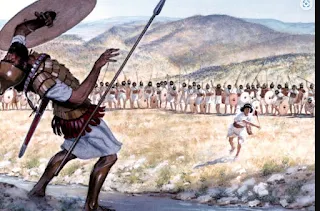Then Saul was very angry, and the saying displeased him; and he said, “They have ascribed to David ten thousands, and to me they have ascribed only thousands. Now what more can he have but the kingdom?” So Saul eyed David from that day forward. 1st Samuel 18:8-9 (NKJV)
Even as God had rejected Saul, the man doggedly held onto power and declared war on God’s newly anointed king in the young shepherd, David.
It is
estimated at the time of his confrontation with Goliath David may have been between
15-17 years old. He would not ascend to full kingship over the nation until age
30, around 993 BC. In the intervening years David and those loyal to him
remained on the run from Saul’s fury, hiding and living in caves throughout the
wilderness.
Saul was
brutal in his hatred of David. After the priest Ahimelek gave David and his
followers permission to eat the tabernacle’s consecrated bread of the Presence (1
Sam 21:6, Luke 6:3-4), Saul ordered 85 Levitical priests executed, destroying
their town of Nob, putting to death everyone, including children and infants, slaughtering even their livestock (Sam. 22:19).
David patiently
waited for God to perform His word while war raged around him. During those
years there were moments of fear, terror, and comfort in his faith. Read
through his psalms and it is evident. Yet he knew the Lord’s love always
protected, was always trustworthy, always offered hope, and always persevered (1st
Corinthians 13:7).
If you are
waiting while your war rages, be encouraged. It might be roaring around you and
you may be on the verge of folding but take heart. Remember how David
patiently waited and trusted the true Word of God through those many years
between His promises. David had that Word through Samuel, and in Christ we have
His Word made flesh, full of grace and truth (John 1:14).
David’s
psalms record his high points and low. Not every day was a victory, nor every
day a defeat. Through many days of uncertainty and nights of despair, he always
recounted God’s faithfulness.
If you are
in a war that has no ending, I can only encourage you to wait, trust, and be
patient as did David and his men. Your battle may have been ignited by another
or even circumstances beyond your control, yet the battle belongs to our Lord
Jesus Christ. Even when it seems battles are lost, His power is holding the enemy at
bay, keeping him from doing greater damage. He will always finish the fight and in any battles lost, win every war (2nd Corinthians 10:4, 1st Corinthians
15:57).
Remember the
Lord’s greeting to a frightened Gideon, hiding from his enemies, “The Lord is
with you, mighty warrior” (Judges 6:12). The battle belongs to the Lord. Let this
be your comfort and peace as the war rages while you wait. The Lord is with you mighty warrior. Grace and peace to you
through Jesus Christ our Lord, the Eternally Triumphant.
Ken






